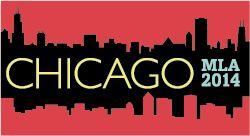 Barring any unforeseen delays or cancellations due to the recent arctic vortex, I will be headed to Chicago for the 129th Modern Language Association Annual Convention, which runs January 9-12. Because I am present first thing Thursday, I am leaving very, very early tomorrow morning hoping my 6 AM flight is on-time and gets me to unmolested to Chicago. Then with a swift cab, I hope to make it to the conference hotel in time for the first sessions.
Barring any unforeseen delays or cancellations due to the recent arctic vortex, I will be headed to Chicago for the 129th Modern Language Association Annual Convention, which runs January 9-12. Because I am present first thing Thursday, I am leaving very, very early tomorrow morning hoping my 6 AM flight is on-time and gets me to unmolested to Chicago. Then with a swift cab, I hope to make it to the conference hotel in time for the first sessions.
Up first, I was asked to present as part of the “Getting Started in the Digital Humanities” pre-conference workshops sponsored by the DHCommons. This year’s theme is on “Digital Pedagogy,” I will be talking about teaching (with) video games. Based on previous programs, my workshop is entitled “Digital Natives vs. Critical Players.” Once again, I will be introduce folks to how I have integrated video games into my courses, to the idea of “close playing,” and to the need to think about a teaching (with) technology philosophy.
Also on Thursday, in the afternoon, I will be part of an esteemed roundtable alongside some colleagues I have met over the years:
Thursday, 9 January
80. Hard Mode: Games and Narratives of Marginalization
1:45–3:00 p.m.
A special sessionPresiding: Anastasia Salter, Univ. of Baltimore
Speakers: Edmond Chang, Drew University, Seattle; Eileen Cheng-Yin Chow, Duke Univ.; Adeline Koh, Richard Stockton Coll. of New JerseyMainstream video games often reflect culturally dominant discourse, with narratives that fail to include marginalized or “vulnerable” voices and groups. As video games are becoming an increasingly visible form of storytelling and entertainment, what role can games from outside these norms play in subverting such marginalizing representations?
For extended abstracts and links to works under discussion, visit hardmode.selfloud.net.
Our roundtable description reads:
Our roundtable will extend the conversations and lines of inquiry started by previous years’ panels and offer a further diversity of perspectives being brought to the challenge outlined by this year’s conference theme. Each of the four presenters will focus on illuminating examples of games whose narrative and creation plays with industry norms and stereotypes. Moreover, each presenter will limit his or her opening remarks to a non-negotiable eight minutes, centering on the specific game and its contribution to our understanding of the potential transformative power of these games. Anastasia Salter will address the fetishization of violence against women as coded into mainstream gamer identity, drawing upon the recent packaging of Dead Island: Riptide in a model of a decapitated and bloody female torso and the controversy over the Tomb Raider debut alongside the virtual attack on Anita Sarkeesian. Edmond Y. Chang will engage sexuality and desire, particularly through massively multiplayer role-playing games like World of Warcraft, and the ways homophobia is hard coded into games and the limits of queerness in design and play. Adeline Koh will discuss the ways in which role-playing games can be used to teach race consciousness, through her development of a historical role playing game titled Trading Races, which places students in the setting of the University of Michigan affirmative action cases in 2003. Eileen Chow will focus on the pedagogical dimensions of game-play as well as of game-design, examining how classroom practices and assignments such as these enable engagement with issues of voice, race, gender, and authorship in radically different ways. The remaining time will be devoted to an open discussion, inviting comparisons and the drawing of parallels with contributions from both the panel and the audience.
And I will be presenting on “Queer(ing) Video Games & Video Game Studies”:
Finally, on Friday morning, I will be part of another roundtable, speaking alongside some familiar faces, including two professors who were on my MA thesis committee, Martha Nell Smith and Marilee Lindemann:
Friday, 10 January
199. Digital Queers, Queering the Digital: Gaming, Programming, Performance
8:30–9:45 a.m.
Program arranged by the Division on Gay Studies in Language and LiteraturePresiding: Martha Nell Smith, Univ. of Maryland, College Park
Speakers: Thom Bryce, York Univ.; Edward Chamberlain, Univ. of Washington, Tacoma; Edmond Chang, Drew University, Seattle; Kimberly Hall, Univ. of California, Riverside; Hannele Kivinen, York Univ.
Respondent: Marilee Lindemann, Univ. of Maryland, College ParkThis roundtable analyzes queer online performances that critique the exclusionary practices of dominant American culture, queering codes in game programming, and queer approaches to new media to make visible that opportunities afforded by queer bodies extend well beyond remembering Alan Turing, the gay iconic code breaker cited by some as historical proof of digital humanities diversity.
My set of provocations will revisit the ideas I started in my presentation last year for PCAACA. I will be talking about “Queerness Can(not) Be Designed: Video Games and the Trouble with Protocol (Part II)”:
All in all, it will be a dizzying first couple of days. But then I can enjoy the rest of the conference, the visit to Chicago (albeit a very cold Chicago), and I’ll get to see some friends who will be in town as well.